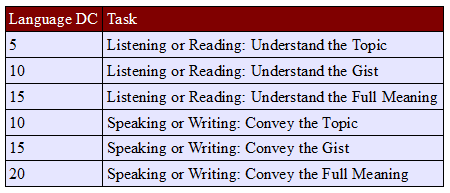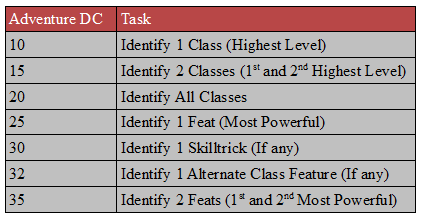Major Houserules
Clay Tokens
Clay Tokens (CT) are a special currency gained by writing lore posts and expanding the game content of Tel'Gia. Clay Tokens can then be used to purchase permanent upgrades for your character. If you have multiple characters, purchases apply to only one selected character. The menu below lists the available character upgrades:
A well-conceived lore post will earn a minimum of 1 Clay Token. Posts will earn an additional Clay Token at 2000 word count and every 2000 words after that. Stories broken into multiple postings are considered a single post for this purpose. Clay Tokens earned from artwork will vary.
XP and Leveling
Experience Points (XP) are gained from combat, roleplaying, puzzle solving, and completing quests. The amount gained is determined using the TG-XP System, which is designed to be both simple and accurate to the pace of traditional D&D. See the table below:
Below is an outline for understanding how enemies in combat typically compare to you for the purpose of determining XP:
- Effortless: 5+ Levels below
- Easy: 3-4 Levels below
- Moderate: 1-2 Levels below
- Challenging: Same Level
- Very Difficult: 1-2 Levels above
- Overpowering: 3-4 Levels above
- Impossible: 5+ Levels above
Spellcasting: Roleplaying Component
Casting a spell requires roleplaying for the spell to be cast successfully. This places a higher burden of roleplaying on players who chose to be spellcasters. To satisfy the Roleplaying Component, you must write 30+ words describing the spellcasting process, saying an incantation, or similar act. Not doing so results in spellfailure. An example is given below:
quote:
Cleric casting Cure Light Wounds:
"Abba father, With just one touch from your Almighty hand, You have healed the sick and raised the dead. How amazing is your rule over all on earth. How powerful is your love. By your great sacrifice you bring us hope and forgiveness. By your stripes, i ask for the healing of this man. As I stand in the crimson blood you have shed for all, I thank you for your gift given to him, and thank you for your overflowing wellspring of life, health, peace and happiness. Amen." ~ Imbellem Tueri
Players perform their turns at the same time, followed by the Opponents who then perform their respective turns at the same time. The Opponents turn is always executed
after the Players turn.
Initiative is determined for the party by the highest roll of that party. If the Players lose the Initiative, then only the Opponents will act in the initial post, usually the same post where Players first enter the encounter. Game Updates after this post will then always proceed with the Players actions performed first, except in the case where an opponent has readied an action.
Skill: Language
Like Craft, Knowledge, Profession, and Perform, Language is actually a number of separate skills. You could have several Languages, each with its own ranks, each purchased as a separate skill. To begin learning a new Language, you must first encounter that Language at least once in the game. Below is a list of Known Languages, sorted by Geography.
quote:
All Tel'Gia
Common
Outside the Isles of Mercia
Dormanian
Shan-tai
Isle of Kabariya
Vaterlandic (related to Syrian)
Styrian (related to Vaterlandic)
Lapish
Duruthin
Usan
Isle of Galia
Galian (related to Estraen and Iagua)
The Dead Isle, and et.
Estraen (related to Galian and Iagua)
Isle of Olseen
Olseeni
Isle of Terrignis Mare
Rhyfellen (related to Cyndadi)
Cyndadi (related to Rhyfellen)
Iagua (related to Galian and Estraen)
Vulnerian (related to Comir)
Isle of Noanatu
Unitian (related to Kanui)
Bongo Wongo
Kanui (related to Unitian)
Comir (related to Vulnerian)
Check:
 Special:
Special:
If you spend 2 or more minutes pondering the meaning of something heard or written, you get a +2 bonus to your Language Check.
Try Again:
For Listening and Reading, No. The check represents what you know, and thinking on it a second time doesn’t let you know something that you never learned in the first place. However, a second check can be made if the same thing is heard or written again in a different way.
For Speaking and Writing, Yes. Retries are allowed but they don't negate things previously spoken or written.
Taking a 10 or 20:
No. This skill is not formed in a way to support this option.
Synergy:
If you have 5 or more ranks in a Language, you get a +2 bonus to Languages related to it.
If you are fluent in a Language, you get a +4 bonus to Languages related to it.
Skill: Knowledge Adventure
Knowledge Adventure allows you to identify the build and abilities of NPC-Adventurers and Player-Adventurers you encounter. This skill applies only to adventurers that have actual classes (e.g. fighter, monk, warlock, etc), and not to monsters that resemble adventurers but do not have an actual class or follow character creation rules (e.g. undead knights, automatons, etc.).
Check:
 Try Again:
Try Again:
A second attempt may be made on an adventurer 48 hours after the first attempt, as new insights may have developed in that time.
Taking a 10 or 20:
No. This skill is not formed in a way to support this option.
Synergy:
If you share a class, feat, etc, with the subject being identified, the DC to identify that aspect is reduced by 4.
This message was last edited by the GM at 00:56, Thu 08 Feb 2018.














